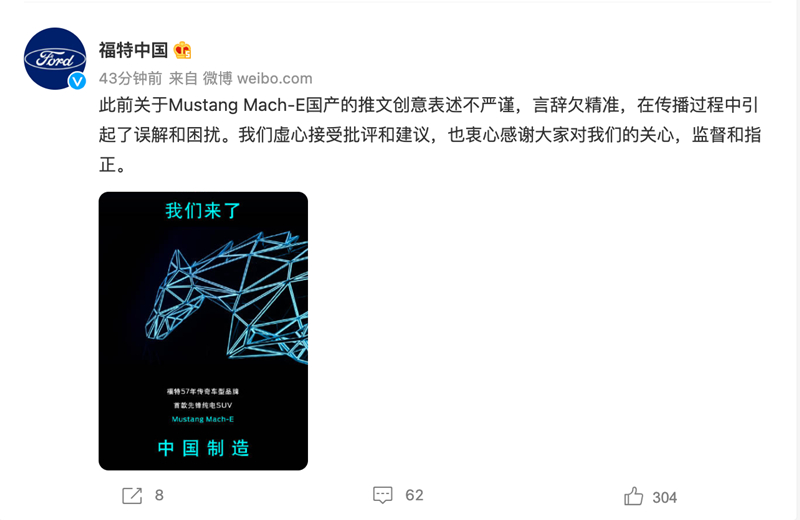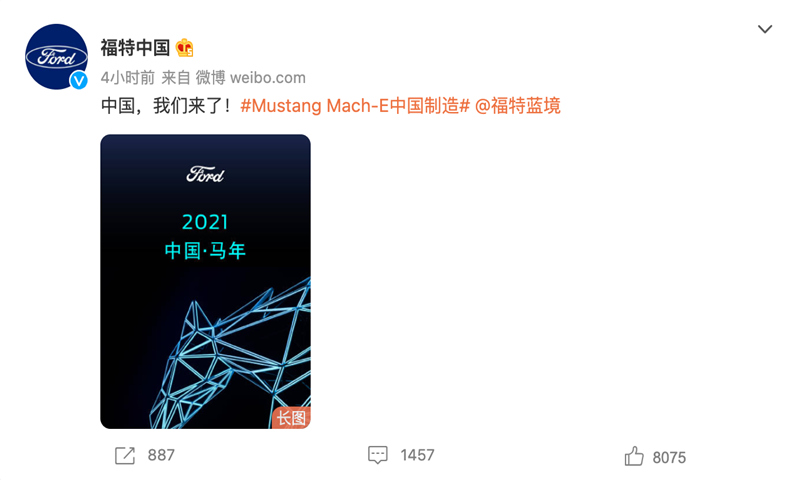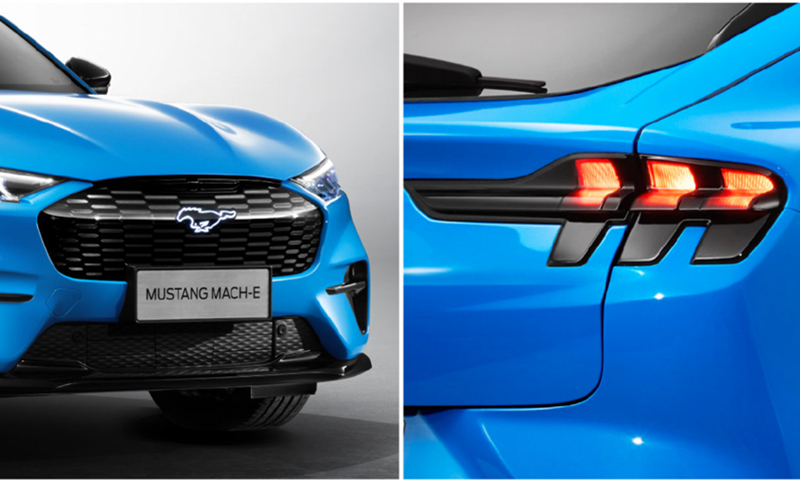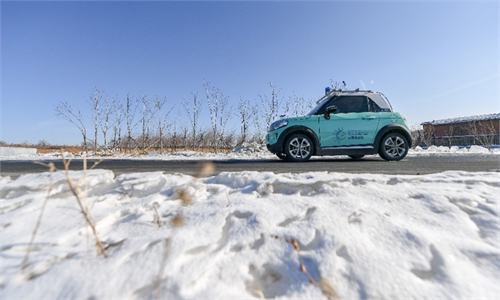Update: Ford apologizes for ad mistaking current Chinese zodiac year
The company interprets the first year of Mustang Mach-E made-in-China to 'year of the horse'
Ford Auto has made an apology for its failure to check the current Chinese zodiac year via Sina Weibo on Monday.

"We accept the criticism and suggestions with an open mind and sincerely thank you for your concern and corrections," wrote Ford on Sina Weibo.
Mustang Mach-E's original copywriting was not expressed clearly, which caused misunderstanding and confusion, it added.
Ford announced on Thursday that its new electric vehicle (EV) will be made in China for local customers, but the announcement poster on Sina Weibo sparked huge attention and mockery among Chinese netizens resulting from Ford mistaking the coming Chinese zodiac Year of the Ox for the Year of Horse.
Later Thursday, Ford explained that the first production year in China of Ford's best-known "horse" - the SUV Mustang Mach-E - is short for the Chinese Year of the Horse.
Mustang Mach-E is translated into Chinese as "Yema", which literally means wild horse.
Some netizens didn't buy the explanation, and said that the advertisement is "poor taste marketing" and didn't respect Chinese culture.
Ford announced on Thursday that its EV Mustang Mach-E will be manufactured in China for the local market.

As showed on the poster, the logo of the car is a running horse, and the series of Mustang cars are known to Chinese as "Ye Ma".

The Year of the Ox will start on February 12, 2021 and last until January 31, 2022, while the Year of the Horse will fall in 2026.
Some netizens angrily accused Ford of "disrespecting" traditional Chinese culture, while others wondered if the move was an example of "dislocation marketing" by the brand, or if Ford wanted to generate a Sina Weibo hot trend for free.
A Sina Weibo user named Pangge Yangli wrote: I think may be in order to promote the electric Mustang, Ford deliberately said that it's the "Year of the Horse". That is, the first year of the production of China's electric "Ma" (horse).
Ford replied to Pangge Yangli, asking if the user had inside knowledge from the marketing team. The company explained that as Ford's best-known "horse" - the pioneering all-electric SUV Mustang Mach-E, the first production year in China of which is short for the Chinese Year of the Horse.
"Today we announced that the Mustang Mach-E will be manufactured in China this year, and 2021 will be the 'Year One' of our electric 'horse'," Ford told the Global Times on Thursday.
According to Ford, Mustang Mach-E is its first global pioneering SUV built on an all-new, all-electric platform and it will be available in China later this year.
For full-year 2020, Ford sold 602,627 vehicles in China, with sales growth of 6.1 percent year-over-year, according to statistics release by Ford. But it was the company's first year-over-year sales growth in China since 2017.
Ford, whose sales are falling, has been ridiculed online by some netizens for making use of the zodiac year to promote its new product.
Before Ford issued the explanation, the topic "Ford mistakes the Year of Ox for the Year of Horse" was trending across the Chinese internet.
Sina weibo user Damixiansheng rice wrote playfully: "I wake up and find that it is already the Year of the Horse (2026)."
Some analyst described Ford's example as a textbook-level marketing, using social media to generate controversy, and then creating a new interpretation of a concept with widespread discussion and awareness. Most importantly, it is essentially free publicity.

Screeshot of Ford's Sina Weibo account on February 1, 2021
"We accept the criticism and suggestions with an open mind and sincerely thank you for your concern and corrections," wrote Ford on Sina Weibo.
Mustang Mach-E's original copywriting was not expressed clearly, which caused misunderstanding and confusion, it added.
Ford announced on Thursday that its new electric vehicle (EV) will be made in China for local customers, but the announcement poster on Sina Weibo sparked huge attention and mockery among Chinese netizens resulting from Ford mistaking the coming Chinese zodiac Year of the Ox for the Year of Horse.
Later Thursday, Ford explained that the first production year in China of Ford's best-known "horse" - the SUV Mustang Mach-E - is short for the Chinese Year of the Horse.
Mustang Mach-E is translated into Chinese as "Yema", which literally means wild horse.
Some netizens didn't buy the explanation, and said that the advertisement is "poor taste marketing" and didn't respect Chinese culture.
Ford announced on Thursday that its EV Mustang Mach-E will be manufactured in China for the local market.

A screenshot of Ford's poster on Sina Weibo.
As showed on the poster, the logo of the car is a running horse, and the series of Mustang cars are known to Chinese as "Ye Ma".

A photo of Mustang Mach-E posted by Ford on Sina Weibo.
The Year of the Ox will start on February 12, 2021 and last until January 31, 2022, while the Year of the Horse will fall in 2026.
Some netizens angrily accused Ford of "disrespecting" traditional Chinese culture, while others wondered if the move was an example of "dislocation marketing" by the brand, or if Ford wanted to generate a Sina Weibo hot trend for free.
A Sina Weibo user named Pangge Yangli wrote: I think may be in order to promote the electric Mustang, Ford deliberately said that it's the "Year of the Horse". That is, the first year of the production of China's electric "Ma" (horse).
Ford replied to Pangge Yangli, asking if the user had inside knowledge from the marketing team. The company explained that as Ford's best-known "horse" - the pioneering all-electric SUV Mustang Mach-E, the first production year in China of which is short for the Chinese Year of the Horse.
"Today we announced that the Mustang Mach-E will be manufactured in China this year, and 2021 will be the 'Year One' of our electric 'horse'," Ford told the Global Times on Thursday.
According to Ford, Mustang Mach-E is its first global pioneering SUV built on an all-new, all-electric platform and it will be available in China later this year.
For full-year 2020, Ford sold 602,627 vehicles in China, with sales growth of 6.1 percent year-over-year, according to statistics release by Ford. But it was the company's first year-over-year sales growth in China since 2017.
Ford, whose sales are falling, has been ridiculed online by some netizens for making use of the zodiac year to promote its new product.
Before Ford issued the explanation, the topic "Ford mistakes the Year of Ox for the Year of Horse" was trending across the Chinese internet.
Sina weibo user Damixiansheng rice wrote playfully: "I wake up and find that it is already the Year of the Horse (2026)."
Some analyst described Ford's example as a textbook-level marketing, using social media to generate controversy, and then creating a new interpretation of a concept with widespread discussion and awareness. Most importantly, it is essentially free publicity.



